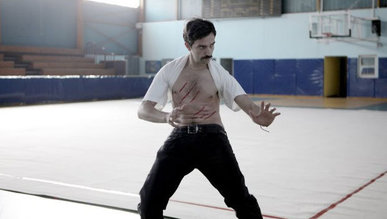Yorgos Lanthimos's Dogtooth remains one of the wackier films I've ever seen, a perfect balancing act between wanting to know more about the setting, and wanting the characters to escape it. As Dogtooth looms so large, Lanthimos's follow-up Alps cannot help but be compared to it, conditioning me to expect the unexpected. There are some similarities, but Alps separates itself by expanding the world with more uniquely-written characters.

Of the Alps group, the most attention is paid to the nurse. Lanthimos follows her throughout the day, at the hospital, where the group generates most of their business, at the acting gigs, and at home, where she takes care of her elderly father (Stavros Psyllakis). She also generates the bulk of the film's conflict, as when the teenager dies, the family hires her without the knowledge of the rest of the group. The nurse grapples with the good she perceives her acting job to do, and her desire to have a life of her own. She bitterly sits alone and watches her father at senior gatherings, dancing the night away, while the rest of her free time is spent serving the emotional needs of her clients. Dogtooth trapped its characters in an estate, while Alps traps its main character in a prison of her own making, drowning in her good intentions.
The other Alps get less screentime but do get their own plots within the strange world of the film. The dancer, specializing in rhythmic gymnastics, is frustrated that her coach makes her dance to classical music, instead of the pop music she wants. This battle frames the film, serving as the opening and closing scenes. Lanthimos does love to film people dancing. The relationship between the dancer and the coach is unsettling, with the age difference suggesting father-daughter but there's also an incestual dynamic reminiscent of Dogtooth. The paramedic is shown as comforting with the clients, but mercenary with their payments behind their back, disappointed when told a possible gig is off because the patient lived. He's also a tyrannical leader, putting those who disobey through cruel punishments. A scene involving a club is an exercise in unbearable tension, as the inevitable result is delayed until the last possible second. Though no backstory is related, the players are all fleshed-out enough that for each of them, the viewer can draw enough of a conclusion about why they're doing what they're doing.
Growing the world of Alps from the small estate of Dogtooth is both a plus and a minus. In the plus category, it's good to see more reactions to the oddities Lanthimos constructs, but on the other hand, the various subplots aren't as concise and focused. Alps is a more diffuse film, with several characters spinning off in their own directions. It might not be Dogtooth, but Alps is another odd and singular experience. Lanthimos stuffs this film with so many unique scenes and images that each new scene is anxiously awaited. Things might be bad in Greece now, but they can at least count one of cinema's most interesting filmmakers as one of their own. B
 RSS Feed
RSS Feed